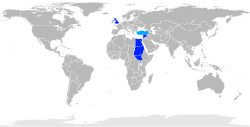
Back جنيه (عملة) Arabic པང་ཏ། Tibetan Lliura (moneda) Catalan Libra (měna) Czech Pund (møntenhed) Danish Pfund (Währung) German Pound (pere) DIQ Pundo Esperanto Libra (divisa) Spanish پوند (یکای پول) Persian

Pound is the name of various units of currency. It is used in some countries today and previously was used in many others. The English word "pound" derives from the Latin expression lībra pondō, in which lībra is a noun meaning 'pound' and pondō is an adverb meaning 'by weight'.[1][2] The currency's symbol is '£', a stylised form of the blackletter 'L' () (from libra), crossed to indicate abbreviation.[3]
The term was adopted in England from the weight[a] of silver used to make 240 pennies,[6] and eventually spread to British colonies all over the world. While silver pennies were produced seven centuries earlier, the first pound coin was minted under Henry VII in 1489.[5]
- ^ Harper, Douglas. "Libra (n.)". Online Etymology Dictionary. Archived from the original on 2 June 2022.
- ^ Harper, Douglas. "pound (n.1)". Online Etymology Dictionary. Archived from the original on 25 May 2022.
- ^ "The Origins of £sd". The Royal Mint Museum. Archived from the original on 8 March 2020.
- ^ "Tower pound". Sizes.com. Retrieved 17 September 2016.
- ^ a b Lowther, Ed (14 February 2014). "A short history of the pound". BBC News. Archived from the original on 1 March 2014.
- ^ "Pound sterling". Britannica. Archived from the original on 16 June 2008. Retrieved 22 July 2021.
Silver coins known as "sterlings" were issued in the Saxon kingdoms, 240 of them being minted from a pound of silver... Hence, large payments came to be reckoned in "pounds of sterlings", a phrase later shortened...
Cite error: There are <ref group=lower-alpha> tags or {{efn}} templates on this page, but the references will not show without a {{reflist|group=lower-alpha}} template or {{notelist}} template (see the help page).
© MMXXIII Rich X Search. We shall prevail. All rights reserved. Rich X Search
